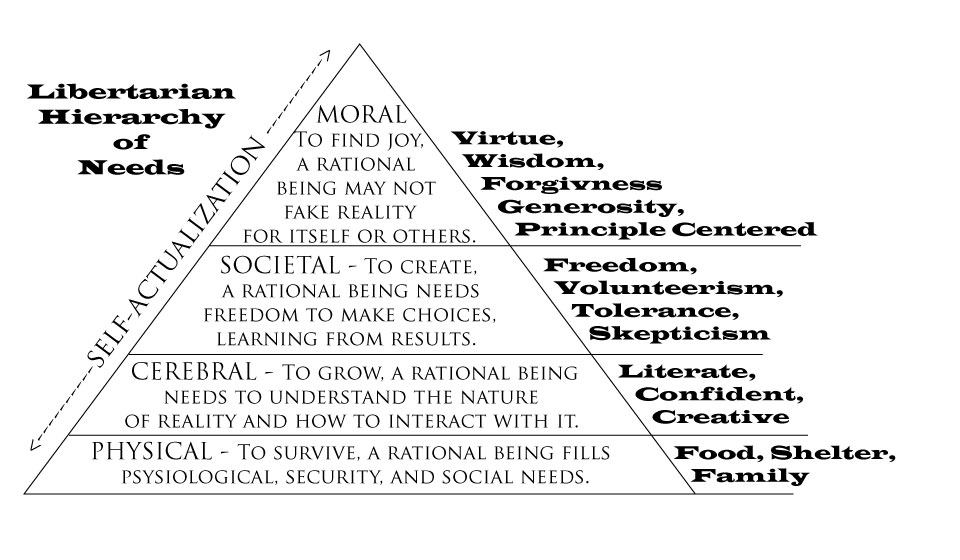Move Over Maslow: A Libertarian Hierarchy of Needs
(Originally published on Blogcritics.org)
I don’t make New Year’s Resolutions, but I do take advantage of this calendar transition to review mission statements, goals, and projects. As part of this annual refocusing I came across an exercise for determining your values and prioritizing them. As I proceeded through the exercise, it occurred to me that I might be doing nothing more than recreating Abraham Maslow’s Hierarchy of Needs. Then I had an insight. His hierarchy doesn’t work for libertarians or other rational creatures.
Maslow Who?
First, if you had more productive things to do than sit through Psychology 101, you might be wondering who this needy Maslow guy is.
In 1943, Maslow theorized that people were motivated to achieve certain needs independent of any system of rewards in which they were involved or unconscious desires that might be hiding in their psyches. Popularized in the 1950s, his theory was usually explained using a pyramid diagram. At the bottom were physiological needs such as food and rest. Above them were safety needs such as shelter and protection from the elements. The next level had needs for love and belonging, followed by needs for esteem, and last, at the top of the pyramid, “Self-Actualization.”
His premise was that no one would care about their self-actualization needs at the pyramid’s top – such as writing a novel – until all the things beneath were taken care of. People were, according to his theories, as predictable as lab rats, no matter what they said their motivations were.
Maslow’s thinking became the basis for modern marketing and advertising methodologies and the underpinning of the U.S. Army Psychological Operations theory, where I first encountered it. During the 1960s, Maslow expanded and refined the hierarchy somewhat and his followers continue to tweak it today, but basically it remains air-sleep-sex at the bottom and beauty-fulfillment-growth at the top.
Even if we exclude the self-destructive, the addicted, and suicide bombers, Maslow’s theory does not explain all needs. Rational people experience the need to suffer for their art, to sacrifice for their career, or to give their life for family or country. All these needs undercut or invert Maslow’s hierarchy.
My Needs Don’t Match Maslow
As I worked through identifying and prioritizing my personal values, I saw that the basic ones mimicked Maslow, if somewhat more elegantly: Health, Family and Financial Security. Health is a prerequisite for effectiveness in all other activities. Family, with its multiple definitions, is the “why” for everything that follows. Financial Security supports the other two.
But this is where Maslow and I part ways. A libertarian hierarchy of needs differs fundamentally from his because of the realization that man is a rational animal. Humans are optimized for functioning in a world in which choices can be made freely, and associations can be entered into voluntarily.
Beyond the physiological, there is the need to grow mentally, to find or create a society incorporating freedom, and ultimately, to find joy. The levels missing from Maslow’s hierarchy are Cerebral, Societal, and Moral.
Cerebral Needs
The rational being needs to understand the world, and how to interact with it, in order to successfully function.
So the next level up the hierarchy is cerebral. The rational animal – and I’m not coming down on either side of the tabula rasa (nature vs. nurture) debate here – needs training on the nature of reality. This value can be provided by parents, schools or other mentors. The needed cerebral result is an individual who is self-reliant, organized, literate, ambitious and creative. These are the characteristics of an efficacious individual.
Societal Needs
The rational being needs freedom in order to make decisions based on reality. The third level is not social, but societal. The rational being needs freedom, tolerance, volunteerism and skepticism toward power and authority.
For the rational creature to function properly, freedom is required in order to make choices and learn from the consequences. Tolerance is required so that new ideas can be tested, not suppressed. A predisposition to volunteerism is required to maintain social structure without resort to government force. When government is required, an attitude of healthy skepticism toward power and authority is needed to keep government in line.
Moral Needs
At the top of the hierarchy are moral needs. Morality consists in not fooling yourself or others about the nature of reality. Without it there can be no joy.
A rational being needs to interact with others who are virtuous, wise, forgiving, generous and principle-centered. Although police and courts are there as a last resort, virtuous people – those who keep their word, can seal a deal with a handshake, and who will not twist language in order to cheat – are the paragon and linchpin of a free society.
Wisdom mitigates against sacrificing long-term advantage for short-term gain. Forgiveness and generosity are required to account for human frailty and the unpredictable aspects of nature. To know, finally, that those you interact with are principle-centered means that you can count on them to be consistent, reliable, and rational.
Where is Self-Actualization?
But where, you might ask, is Maslow’s self-actualization?
Self-actualization is not, as Maslow would have it, an afterthought to be considered only after you have eaten, turned up the thermostat, found a mate, and gotten a good performance review. Rather, it is there at every step up the pyramid. The rational being is self-actualizing when it builds or maintains shelter, creates a stable social group, finds a place in a free society, develops self-discipline and commits to a virtuous life.
Self-actualization can be found in running a multi-national corporation, crafting leather goods, raising children, tuning an automobile engine, teaching calculus, or writing an essay. Self-actualization is not the end, it is the journey.



Leave a Reply